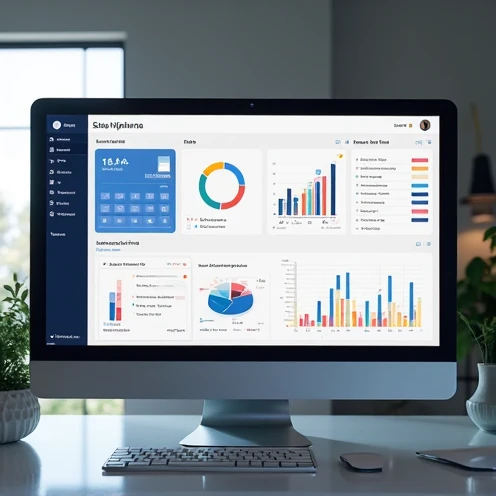Understanding CRM and Its Role in Business Success
Customer Relationship Management (CRM) has become a cornerstone for modern businesses that want to thrive in a competitive marketplace. At its core, CRM refers to strategies, technologies, and systems designed to manage interactions with customers. It helps businesses build stronger relationships, improve customer satisfaction, and boost profitability. In today’s digital era, CRM is no longer just about storing customer data. Instead, it has evolved into an intelligent tool that integrates with sales, marketing, and customer service. By leveraging Custom CRM Development effectively, businesses can personalize experiences, automate workflows, and make data-driven decisions that ultimately lead to growth.
Why Choose Custom CRM Development
Iklan Google AdSense
Every business is unique, and so are its processes. That’s where Custom CRM Development comes in. Unlike off-the-shelf solutions, a custom-built CRM system is tailored to your company’s specific needs, ensuring seamless integration with your existing tools and workflows.
Moreover, custom solutions allow businesses to scale effortlessly. As your company grows, the CRM evolves with it—supporting advanced features like AI-driven analytics, automated marketing campaigns, and predictive customer behavior analysis. This flexibility ensures that your investment continues to deliver value long-term.
Iklan Google AdSense
The Benefits of a Tailored CRM System
A customized CRM helps businesses eliminate unnecessary features that might clutter an off-the-shelf solution. This lean approach improves efficiency and usability. Furthermore, it ensures that your CRM aligns perfectly with your sales pipeline, customer journey, and reporting requirements.
Another key benefit is competitive advantage. By developing a CRM designed around your business model, you gain insights that your competitors might overlook. From personalized dashboards to automated follow-ups, a custom CRM becomes a unique asset that enhances your market position.
Improved Customer Engagement
One of the most critical goals of CRM is to enhance customer engagement. Custom CRM systems enable businesses to design tailored communication strategies. Whether it’s through email, chatbots, or social media, a well-developed CRM makes every interaction more meaningful.
Additionally, personalized engagement leads to increased loyalty. When customers feel understood, they are more likely to return, recommend your brand, and become advocates. With Custom CRM Development, businesses can design experiences that nurture long-term customer relationships.
Custom CRM Development: Integrating CRM with Business Operations
Integration is one of the most valuable aspects of a CRM system. A custom-built solution connects seamlessly with existing platforms, such as ERP, e-commerce tools, or accounting software. This integration ensures data consistency across departments, leading to better decision-making.
For example, a sales team can instantly access inventory levels before making a deal, while customer service representatives can view past purchase histories to resolve issues quickly. Such connected operations improve efficiency and reduce operational costs.
Automation for Enhanced Productivity
Automation is a game-changer in CRM systems. A tailored CRM can automate repetitive tasks such as data entry, follow-up reminders, and lead assignments. This not only saves time but also minimizes human errors.
With automation, teams can focus on strategic initiatives like nurturing leads and closing deals. Businesses that leverage CRM automation often see significant improvements in productivity and sales performance.
Data-Driven Decision Making
Data is the backbone of any successful business strategy. A custom CRM system collects, stores, and analyzes customer data in real time. This empowers managers to make informed decisions backed by accurate insights.
From identifying sales trends to predicting future demands, data-driven strategies ensure that businesses stay one step ahead. Custom dashboards and reports allow different departments to access the exact information they need, fostering collaboration and alignment across the organization.
Enhancing Customer Retention with Insights
Retaining customers is more cost-effective than acquiring new ones. A CRM helps businesses track customer behavior and identify churn risks. With these insights, companies can design targeted loyalty programs, personalized offers, and proactive support initiatives.
By addressing issues before they escalate, businesses build trust and increase customer lifetime value. In essence, CRM transforms customer data into actionable strategies for retention and growth.
Cost Efficiency and ROI of Custom CRM
Some businesses hesitate to invest in Custom CRM Development because of upfront costs. However, when viewed as a long-term investment, the return on investment (ROI) is substantial. By eliminating inefficiencies, increasing sales, and improving customer loyalty, custom CRM solutions pay for themselves over time.
Additionally, businesses avoid the recurring licensing fees associated with off-the-shelf CRMs. With full ownership of the system, companies have greater control over costs and scalability.
Custom CRM Development: Future-Proofing Your Business
Technology is constantly evolving, and so are customer expectations. A custom CRM allows businesses to stay adaptable by integrating emerging technologies such as artificial intelligence, machine learning, and advanced analytics. This future-proof approach ensures that your CRM system remains relevant and continues to support your business objectives for years to come.
The Importance of User-Friendly Design
No matter how powerful a CRM system is, it must be user-friendly to succeed. Employees are more likely to adopt a system that is intuitive and easy to navigate. A custom-built CRM ensures that the interface is designed with your team’s needs in mind.
User-friendly design reduces training time and increases adoption rates. Moreover, it minimizes frustration, enabling employees to focus on delivering value rather than struggling with technology.
Customization for Different Teams
Each department has unique needs. Sales teams may prioritize pipeline management, while customer service teams focus on ticket resolution. A tailored CRM can provide role-specific features and dashboards to ensure that every team gets the tools they need to excel.
This flexibility ensures that the CRM system is not just a management tool but a daily productivity booster for every employee.
Custom CRM Development: Security and Data Privacy in CRM
With increasing concerns about data breaches, businesses must prioritize security. A custom CRM can be developed with robust security protocols tailored to your industry’s compliance requirements. From encrypted databases to role-based access, security features safeguard sensitive customer information.
Data privacy also builds customer trust. When businesses demonstrate a commitment to protecting data, customers feel more confident sharing their information. This trust translates into stronger relationships and long-term loyalty.
How to Get Started with Custom CRM Development
Developing a custom CRM system begins with a needs assessment. Businesses must evaluate their processes, identify challenges, and define goals. This clarity helps developers design a solution that aligns perfectly with your objectives.
Once goals are defined, the development team creates a roadmap, including design, development, integration, testing, and deployment phases. Collaboration between stakeholders ensures that the final product meets expectations and delivers maximum value.
Choosing the Right Development Partner
Selecting the right partner is crucial for successful CRM development. Look for developers with experience, industry knowledge, and a proven track record. A reliable partner not only delivers the system but also provides ongoing support, ensuring your CRM evolves with your business.
Transparent communication, clear timelines, and post-launch assistance are vital factors in choosing the right development partner. This collaboration guarantees that your CRM journey is smooth and successful.
Future Trends in CRM
The future of CRM is exciting, with technologies like AI, IoT, and predictive analytics reshaping customer interactions. Businesses that embrace these trends will enjoy improved efficiency, deeper insights, and stronger relationships.
Custom CRM systems are well-positioned to integrate these innovations quickly. By staying ahead of technological trends, businesses ensure that they remain competitive and capable of meeting evolving customer demands.
The Role of Artificial Intelligence in CRM
AI-powered CRMs are revolutionizing customer management. From chatbots providing instant support to predictive models forecasting customer behavior, AI enhances every aspect of CRM. Custom development allows businesses to tailor AI features to their unique requirements, maximizing impact.
With AI integration, CRM becomes not just a tool for managing relationships but a driver of innovation and growth.
Iklan Bersponsor Google






